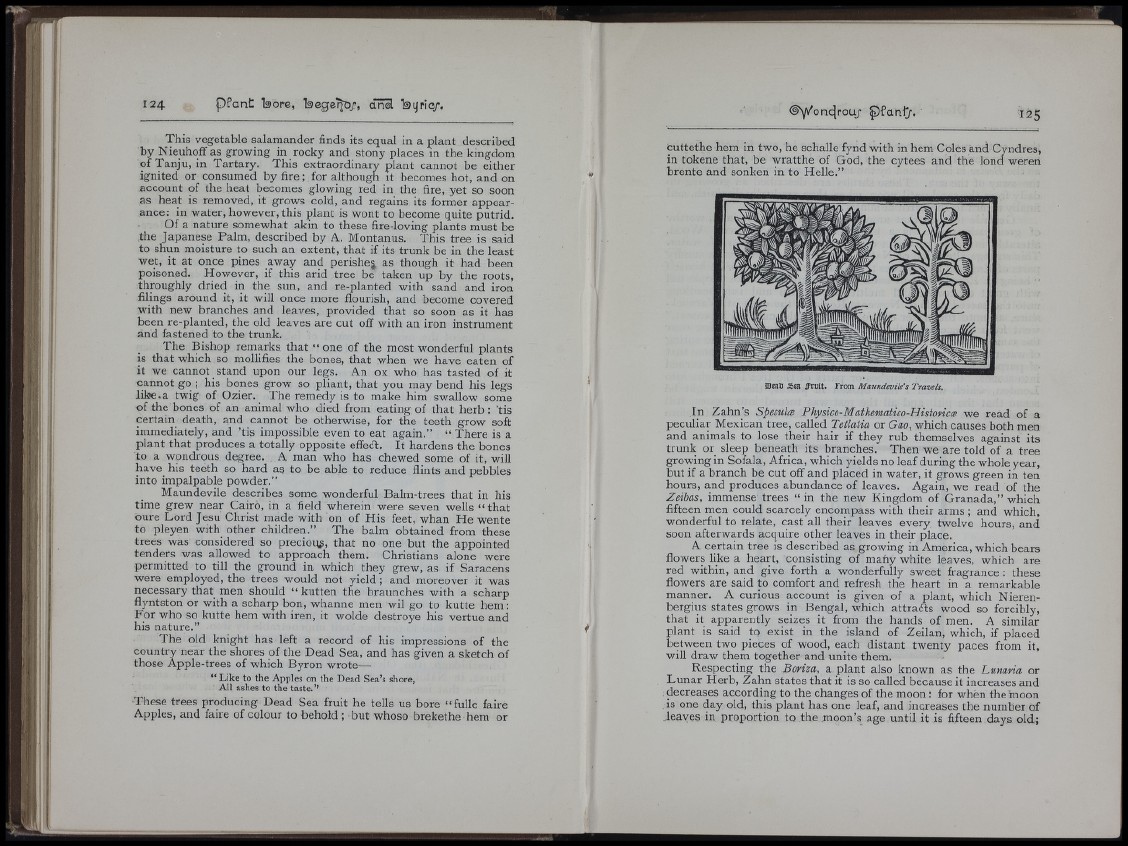
K>tl
It
Ii
This vegetable salamander finds its equal in a plant described
by Nieuhqff as growing in rocky and stony places in the kingdom
of Tanju, in Tartary. This extraordinary plant cannot be either
ignited or consumed by fire ; for although it becomes hot, and on
account of the heat becomes glowing red in the fire, yet so soon
as heat is removed, it grows cold, and regains its former appearance
: in water, however, this plant is wont to become quite putrid.
Of a nature somewhat akin to these fire-loving plants must be
the Japanese Palm, described by A. Montanus. This tree is said
to shun moisture to such an extent, that if its trunk be in the least
wet, it at once pines away and perishe§, as though it had been
poisoned. However, if this arid tree be taken up by the roots,
throughly dried in the sun, and re-planted with sand and iron
filings around it, it will once more flourish, and become covered
with new branches and leaves, provided that so soon as it has
been re-planted, the old leaves are cut off with an iron instrument
and fastened to the trunk.
The Bishop remarks that “ one of the most wonderful plants
is that which so mollifies the bones, that when we have eaten of
it we cannot stand upon our legs. An ox who has tasted of it
cannot go ; his bones grow so pliant, that you may bend his legs
like.a twig of Ozier. The remedy is to make him swallow some
of the bones of an animal who died from eating of that herb : ’tis
certain death, and cannot be otherwise, for the teeth grow soft
immediately, and ’tis impossible even to eat again.” “ There is a
plant that produces a totally opposite effecfi. It hardens the bones
to a wondrous degree. A man who has chewed some of it, will
have_ his teeth so hard as to be able to reduce flints and pebbles
into impalpable powder.”
Maundevile describes some wonderful Balm-trees that in his
time grew near Cairo, in a field wherein were seven wells “ that
oure Lord Jesu Christ made with on of His feet, whan He wente
to pleyen with other children.” The balm obtained from these
trees was considered so precioqß, that no one but the appointed
tenders was allowed to approach them. Christians alone were
permitted to till the ground in which they grew, as if Saracens
were employed, the trees would not y ie ld ; and moreover it was
necessary that men should “ kutten the braunches with a scharp
fiyntston or with a scharp bon, whanne men wil go to kutte hem:
For who so kutte hem with iren, it wolde destroye his vertue and
his nature.”
The old knight has left a record of his impressions of the
country near the shores of the Dead Sea, and has given a sketch of
those Apple-trees of which Byron wrote—
“ Like to the Apples on the Dead Sea’s shore,
All ashes to the taste.”
These trees producing Dead Sea fruit he tells us bore “ fülle faire
Apples, and faire of colour to behold ; but whoso brekethe hem or
tuttethe hem in two, he schalle fynd with in hem Coles and Cyndres,
in tokene that, be wratthe of God, the cytees and the lond weren
brente and senken in to Helle.”
DealJ <Sca JJruit. From Maundevile*s Travels.
In Zahn’s Specult^ Physico-Mathematico-HistoHciB we read of a
peculiar Mexican tree, called Tetlatia or Gao, which causes both men
and animals to lose their hair if they rub themselves against its
trunk or sleep beneath its branches. Then we are told of a tree
growing in Sofala, Africa, which yields no leaf during the whole year,
but if a branch be cut off and placed in water, it grows green in ten
hours, and produces abundance of leaves. Again, we read of the
Zeihas, immense trees “ in the new Kingdom of Granada,” which
fifteen men could scarcely encompass with their arms ; and which,
wonderful to relate, cast all their leaves every twelve hours, and
soon afterwards acquire other leaves in their place.
A certain tree is described as growing in America, which bears
fiowers like a heart, consisting of many white leaves, which are
red within, and give forth a wonderfully sweet fragrance : these
fiowers are said to comfort and refresh the heart in a remarkable
manner. A curious account is given of a plant, which Nieren-
bergins states grows in Bengal, which attracts wood so forcibly,
that it apparently seizes it from the hands of men. A similar
plant is said to exist in the island of Zeilan, which, if placed
between two pieces of wood, each distant twenty paces from it,
will draw them together and unite them.
Respecting the Boriza, a plant also known as the Lunaria or
Lunar Herb, Zahn states that it is so called because it increases and
Jc re a se g according to the changes of the moon: for when the moon
is one day old, this plant has one leaf, and increases the number of
„leaves in proportion to the moon’s age until it is fifteen days old,.;